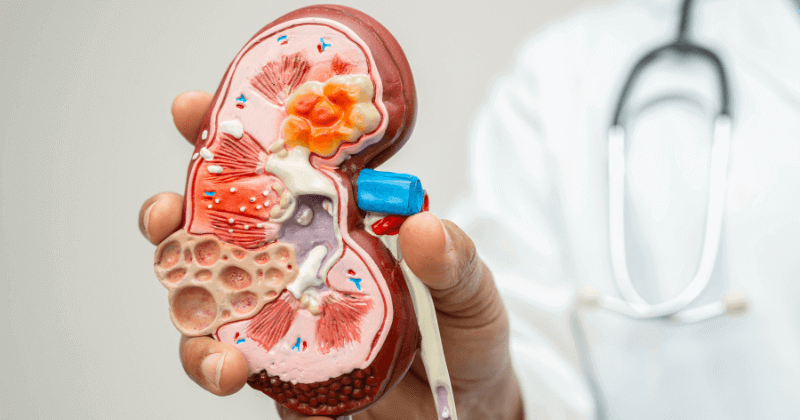Does Creatine Cause Kidney Damage?
Creatine - If you've stepped into the world of fitness in India, whether you're a beginner or a gym veteran, there’s a high chance you’ve come across creatine.
It's often hailed as one of the most effective and widely researched sports supplements.
But despite its popularity, one question continues to stir doubt: Does creatine cause kidney damage?
What Is Creatine and How Does It Work?
Creatine is a naturally occurring compound found in your muscles and brain. It’s produced by the liver, kidneys, and pancreas using amino acids like glycine, arginine, and methionine.
You can also get creatine through foods such as red meat, fish, and dairy products, though in relatively small amounts.
In the body, creatine is converted into phosphocreatine, which helps regenerate ATP (adenosine triphosphate), the primary energy currency of our cells.
This process becomes crucial during short bursts of high-intensity activity, such as sprinting, weightlifting, or power sports like kabaddi and wrestling.
Does Creatine Cause Kidney Damage?
No, creatine does not cause kidney damage in healthy individuals when taken in recommended doses with proper hydration.
Creatine is generally safe for healthy people, but caution is needed if you have existing kidney disease or conditions that put strain on the kidneys.
✅ Who Should Be Careful?
-
People with chronic kidney disease (CKD)
-
Individuals with diabetes or high blood pressure
-
People who are on nephrotoxic medications (drugs that can damage the kidneys)
-
Those with a family history of kidney issues
✅ Why the Concern?
In people with compromised kidneys, any added workload, such as increased creatinine production, can be problematic.
Although research is limited in such populations, it is generally advised to avoid creatine if you have renal problems unless cleared by a nephrologist.
✅ Always Consult Your Doctor
In India, where self-medication and over-the-counter supplement use are common, it is vital to get medical advice before starting creatine, especially if you have a known medical condition.
The Origin of the Kidney Damage Myth
The myth that creatine damages kidneys largely stems from misinterpretations of blood tests and isolated case reports.
Many people who take creatine see a rise in serum creatinine levels in blood reports.
Serum creatinine is a waste product formed from creatine metabolism and is used as a marker to assess kidney function.
Naturally, if this value goes up, doctors might suspect kidney impairment.
But here’s the twist: the rise in creatinine due to creatine supplementation doesn’t indicate kidney failure; it simply reflects an increase in creatine metabolism.
Misinformation and Social Media
In India, health-related myths spread quickly through platforms like WhatsApp, YouTube, and Instagram.
A single influencer or so-called "fitness guru" claiming creatine harms kidneys can create panic among thousands.
With low awareness of scientific evidence, people often believe anecdotal statements over peer-reviewed studies.
What Science Says: Research on Creatine and Kidney Function?
So, what does actual science say? Can creatine harm your kidneys?
✔ Long-Term Studies and Their Findings
Multiple long-term studies have been conducted on healthy individuals consuming standard creatine doses (3–5 grams per day). Some of the key findings:
-
A 2001 study in the Journal of Sports Medicine followed subjects for 5 years and found no adverse effects on kidney function with regular creatine use.
-
A 2003 review in Molecular and Cellular Biochemistry concluded that there is no scientific evidence linking creatine with renal dysfunction in healthy people.
-
A 2008 randomized controlled trial published in the European Journal of Applied Physiology also reported no significant changes in kidney biomarkers in subjects taking creatine for 12 weeks.
✔ What About High Doses?
Even studies with loading phases (20 grams per day for 5–7 days) followed by maintenance doses have shown no harmful effects in individuals without pre-existing kidney issues.
✔ Indian Research Context
Although most studies have been conducted in Western populations, Indian athletes and fitness enthusiasts use creatine similarly.
As long as it is taken responsibly and with proper hydration, there is no evidence that it harms the kidneys of healthy Indians.
The Indian Context: Diet, Hydration, and Supplement Use
To understand creatine’s safety better, let’s explore it in the Indian context.
🌟 Indian Diets and Creatine Deficiency
Traditional Indian diets, especially vegetarian ones, are low in creatine. This makes supplementation even more beneficial for vegetarians and vegans.
Since creatine is mostly found in animal-based foods, vegetarians often start at a lower baseline of creatine levels.
As a result, they may see more pronounced benefits from supplementation, including better exercise performance and muscle gain.
🌟 Hydration Matters
Indian summers are notoriously hot and humid. Dehydration is a serious concern, and creatine does pull some extra water into muscle cells.
While this is not dangerous in itself, not drinking enough water while taking creatine can lead to cramps or stomach discomfort.
Tip for Indian Users: Aim for at least 3–4 liters of water per day, especially if you’re supplementing with creatine and exercising in warm climates.
🌟 Supplement Quality: An Overlooked Factor
Not all creatine products in the Indian market are high quality. Some low-cost or unregulated brands may contain contaminants, heavy metals, or harmful fillers.
Always buy from reputable, lab-tested brands. Look for Creapure®, a patented form of pure creatine monohydrate that is widely trusted.
Conclusion
Creatine is one of the most researched and safest supplements in the fitness world. The fear of kidney damage is largely based on misinterpretation and misinformation, not science.
For Indian fitness lovers, from college students to working professionals, creatine can be a powerful ally when used correctly.
Instead of falling for hearsay or outdated myths, base your choices on science, common sense, and personal health status.
If you're healthy, active, and well-hydrated, there's little reason to fear creatine. It’s time to replace fear with facts and use this supplement to unlock your body’s full potential.
